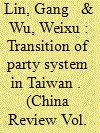| Srl | Item |
| 1 |
ID:
187937


|
|
|
|
|
| Summary/Abstract |
Soon after China reportedly achieved the goal of poverty alleviation in most regions ahead of schedule, a campaign of "follow-up check" of the deviations in policy implementation became a key task for local governments from 2019 to 2020. A case study of town H in province M during the "follow-up check" period revealed that local governments at various levels enjoy different authorities in goal setting, inspection, and incentive provision. However, the campaign-styled "follow-up checks" cannot meaningfully overcome the problem of inefficient governance. As the work of poverty alleviation comes to an end, local governments are under time pressure to solve protracted problems, uncertain about whether the higher-level government over them will exercise its authority in inspection and job acceptance. Local governments tend to displace the original goal with new and additional work targets to ensure successful acceptance of their jobs by the upper-level government. This study observes the practice of "follow-up checks" of poverty alleviation and provides an explanation for different governmental behavior taken in campaign-styled governance.
|
|
|
|
|
|
|
|
|
|
|
|
|
|
|
|
| 2 |
ID:
155226


|
|
|
|
|
| Summary/Abstract |
This article attempts to explore the evolution of power structure of the two main parties in Taiwan and the possibility of transformation of party politics from divergence to convergence. Institutionally, the game of plurality voting system tends to marginalize the third party and encourage a balanced two-party system. It may also pull the two parties toward the central line amid increasing interparty competition. From the social perspective, however, the inherently different supporters of the two parties tend to pull the parties away from the direction of convergence. While KMT supporters are more caring about economic growth and a good relationship with the mainland, DPP supporters are more concerned about distributional justice and worried that close cross-strait relations may present a greater threat to the island, either politically or economically. These social cleavages have underscored different policy positions of the two parties. This article concludes that while the KMT and the DPP have reduced their difference in social and economic policies, they are still divided on the issue of how to deal with the Chinese mainland, namely, whether Taiwan should be attached to or detached from the mainland in the future.
|
|
|
|
|
|
|
|
|
|
|
|
|
|
|
|
| 3 |
ID:
185969


|
|
|
|
|
| Summary/Abstract |
Through a quantitative analysis of Taiwan–related legislation between 1979 and 2020, the article finds that the degree of Taiwan–related legislation is significantly correlated with the degree of tension in U.S.—China relations. While a deteriorating cross–Taiwan Strait relationship is clearly associated with the increasing legislative activities for the sake of Taiwan, an improving relationship from the state of fair to good cannot guarantee a decrease of such activities. A unified government and the extent of the Taiwan lobby are both helpful in passing pro–Taiwan acts but statistically insignificant. A content analysis of pro–Taiwan bills approved by the Trump administration suggests a creeping movement to “normalize” U.S–Taiwan relations with congressional activism and the less-restrained White House as a co–engine.
|
|
|
|
|
|
|
|
|
|
|
|
|
|
|
|